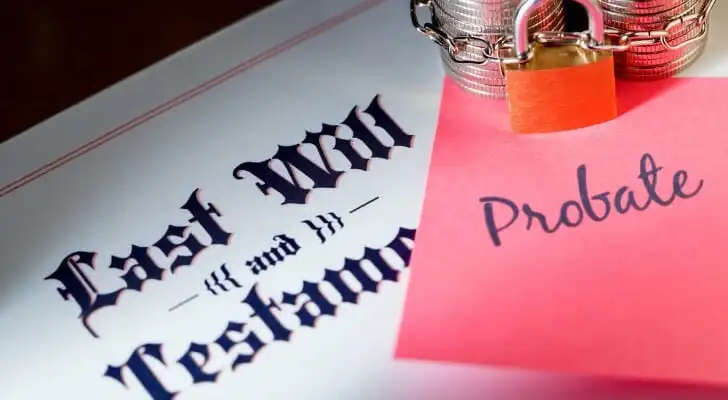 Estate planning can be complicated. You often need the services of a professional. Preparing a will is only one part of the estate planning process. When you are preparing your will, you need to decide whether or not a no-contest clause is appropriate. A no-contest clause is designed to prevent beneficiaries from challenging a will after you die. Here’s how it works and why you may want to include one in your will. A financial advisor can help you with all aspects of estate planning.
Estate planning can be complicated. You often need the services of a professional. Preparing a will is only one part of the estate planning process. When you are preparing your will, you need to decide whether or not a no-contest clause is appropriate. A no-contest clause is designed to prevent beneficiaries from challenging a will after you die. Here’s how it works and why you may want to include one in your will. A financial advisor can help you with all aspects of estate planning.
What Is a No-Contest Clause in a Will?
A no-contest clause in a will is sometimes called a “penalty clause.” The legal term for a no-contest clause is an “in terrorem” clause. The purpose of a no-contest clause in a will or revocable living trust is to put beneficiaries in fear of losing their inheritance if they challenge the will in court. A no-contest clause usually states that a beneficiary will lose anything they were to inherit upon a person’s death should they try to contest the will. For a no-contest clause to work, the beneficiaries must be inheriting something of value from the will or there will be no motivation not to go to court.
Benefits of a No-Contest Clause
Including a no-contest clause in your will has several potential benefits:
- It may keep down family bickering and strife because you have made it very clear to heirs and family who is to inherit.
- It could lessen the likelihood of years of litigation that will reduce the value of your estate.
- It will keep the details of your life and estate private. If a will is litigated, the details of the estate become available to the public.
The Probate Process
 When a person dies, chances are their estate will enter the probate process. The purpose of the probate process is to authenticate the validity of their last will and testament. Before estate assets can be distributed to the heirs of the estate, anyone with “standing” can claim of share of the assets by appearing in court. This is called contesting the will. To show standing the person contesting the will must be able to show that he or she may be entitled to be an heir and share in the asset distribution.
When a person dies, chances are their estate will enter the probate process. The purpose of the probate process is to authenticate the validity of their last will and testament. Before estate assets can be distributed to the heirs of the estate, anyone with “standing” can claim of share of the assets by appearing in court. This is called contesting the will. To show standing the person contesting the will must be able to show that he or she may be entitled to be an heir and share in the asset distribution.
States have different laws about what standing actually means. If there are circumstances that a judge deems worthy, a person with standing has a chance of breaking the will. A no-contest clause is put in a will only if the testator (the person who is making the will) feels that because of a family or other situation, someone may indeed try to keep the will from being authenticated.
A No-Contest Clause May Be Non-Enforceable
There are certain circumstances when a no-contest clause may not be enforceable. Laws vary across jurisdictions. In Florida and Indiana, no-contest clauses are not enforceable. Be sure and check your state and county laws. In some jurisdictions, a no-contest clause may not be enforceable if there is suspicion of fraud or forgery, if the person contesting the will has probable cause or if there is suspicion of undue influence on the person who made the will.
The judge makes the decision about these circumstances and whether or not those contesting the will have a valid claim. Be sure and sign your will. If it is left unsigned, that often constitutes probable cause and your will could be contested and possibly broken.
How to Keep Your Will from Being Contested
There are no sure-fire techniques for keeping your will from being contested, but there are actions you can take to lessen the likelihood of your will being contested.
- Make sure your will is prepared by a professional and signed and witnessed by two witnesses. It may be a good idea to have video of you signing your will and the witnesses signing as well. This will help verify that you are physically and mentally able to sign your will and are of sound mind.
- Mention someone who witnesses your will that no one would question. A community cleric would work here.
- Visit a psychologist or psychiatrist who can establish a medical record of your state of mind at the same time you are doing your estate planning.
- Put the non-contact clause in your will and explain the penalties if a possible heir tries to contest it. Be very clear and methodical.
- Finally, be careful when favoring one heir over others. For example, consider letting your children know ahead of time to minimize resentments, perhaps by explaining your reasoning. If you want to bequeath significant sums to someone outside the family or to an organization, considering it might be wise to let your children know why so they won’t feel surprised or feel short-changed after you die.
The Bottom Line

No-contest clauses in a last will and testament are meant to cut down on family discord at the time someone dies and the will is probated. However, they are not standard fare in a will. You have to ask your attorney to include a no-contest clause in your will. Make your decision about including one in consultation with your attorney and the considerations mentioned here into account.
Tips on Estate Planning
- Estate planning is a complicated process if you have many assets, a blended family, sibling rivalry or a large estate. A financial advisor can be extremely helpful. Finding a qualified financial advisor doesn’t have to be hard. SmartAsset’s free tool matches you with up to three financial advisors in your area, and you can interview your advisor matches at no cost to decide which one is right for you. If you’re ready to find an advisor who can help you achieve your financial goals, get started now.
- Take a look at SmartAsset’s Estate Planning Guide for more detailed information and assistance.
Photo credit: ©iStock.com/izusek, ©iStock.com/Motortion, ©iStock.com/stocknshares